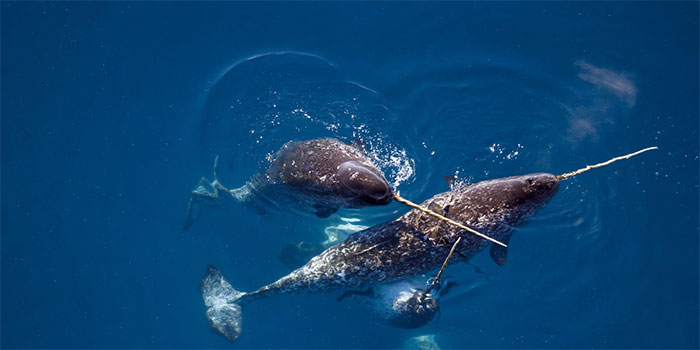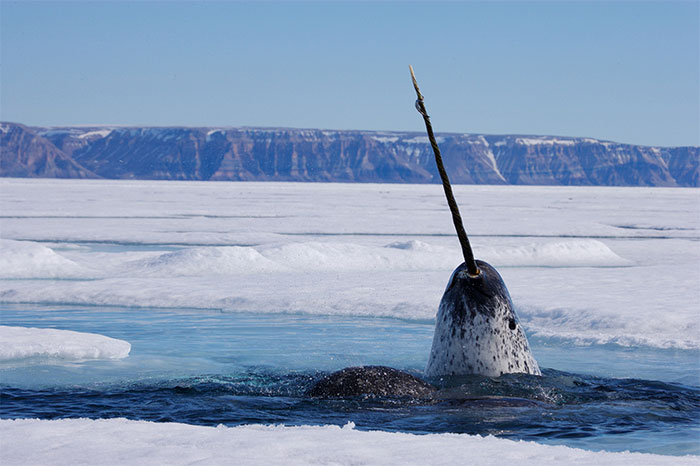Please listen to the rare sounds created by the unicorn
With help from the Inuit whale hunters team, the team of oceanographers successfully synthesized a unique 'music album' : a collection of chords created by narwhal. These will be the guiding sounds for researchers to understand the behavior of this strange creature.

Science still doesn't have enough data on the unicorn sound.
The unicorn possesses such a 'magical' name because of its long horn that grows right on their forehead. They are also famous for being difficult to study because of their defiance and special habitat. Normally, unicorns dive to the depths of the Arctic Ocean, but every summer they will gather on the north coast of Canada and around the Greenland area.
Frequent unicorn areas are difficult to access, which is a major obstacle preventing scientists from better understanding the mysterious animal. Even when entering dangerous areas, the sound of a loud motorboat will also drive away unicorns and unicorns. This is also the reason why science still doesn't have all the unicorn sounds.

Unicorns emerge from the ice.
Part of another reason you're probably not expecting: unicorns live in one of the noisiest areas in the oceans . In a new research report published in the journal of the United States Geophysical Union, the scientists describe the region of extremely noisy glaciers, with all the noise coming from the sound of ice created. on the water.
Sound is a powerful tool to help scientists study marine animals, but unicorns have hid in hard-to-find places and still live in a noisy environment, scientists cannot conduct research alone. . Two new study authors, Evgeny Podolskiy and Shin Sugiyama, have teamed up with local whale hunters - who are allowed to hunt wildlife to balance their ecosystems - in search of the truth. People accustomed to the cold waters here know the approach very close to the unicorn.
In the research report, the scientists wrote: ' Local hunters who understand the unicorn's habitat and behavior are more likely to spot an individual faster than outsiders. At first, they identified the unicorn from afar with binoculars or the naked eye, then they turned off the engine, waited for some time, and then rowed the boat back . '
This approach allows oceanographers to record unicorn sounds created in this environment. They recorded nearly 17 hours of audio, and the valuable data immediately became a valuable research document.
In addition to the call of their kind, the researchers also identified the unicorn sound that made when using echoes to locate prey. Like dolphins, narwhal increase in sound frequency when approached close to their prey; the sound they make is similar to the "drone" sound of a drone.
The new research also shows that unicorns are more reckless than we thought, closer to the glacier than expected; this area often sees large icebergs fall into the water, which should have scared the unicorns, but in fact, unicorns don't mind getting close to the 1km radius from the glacial shore that is continually falling. miss.
Among the data collected, there are still many 'headache-causing' sounds that cause scientists. They still have a lot of work to do before deciphering the rich language of exotic sea creatures. An attempt to understand unicorns is also in part an attempt to analyze human impacts on the species, in order to better protect them in the future.
- The appearance of unicorns caused a stir because it was too different
- The skull of the unicorn is real on Earth
- Listen to mice 'sing' like birds
- A rare syndrome, the girl heard blood flowing in her veins
- Scuba diving with 'ocean unicorns'
- Why are you angry when the next person chews?
- Out of soul with strange sounds from the ice lake in Siberia
- Video: The journey to listen to the heart of the Earth mother
- The DNA of the mysterious Siberian unicorn species was first analyzed
- Secrets of the sea: Sounds and sea creatures
- Be quiet, if you hear uu in your ears, this is why
- One-horned sheep escapes the slaughterhouse because of the unicorn
 Surprised: Fish that live in the dark ocean still see colors
Surprised: Fish that live in the dark ocean still see colors Japan suddenly caught the creature that caused the earthquake in the legend
Japan suddenly caught the creature that caused the earthquake in the legend A series of gray whale carcasses washed ashore on California's coast
A series of gray whale carcasses washed ashore on California's coast Compare the size of shark species in the world
Compare the size of shark species in the world